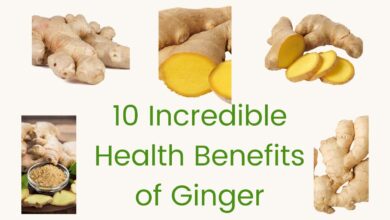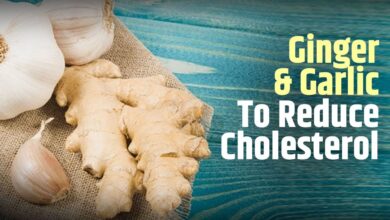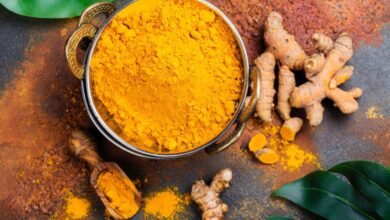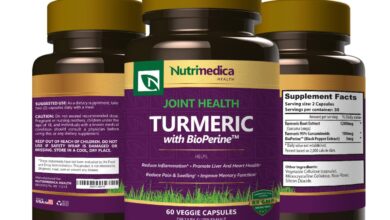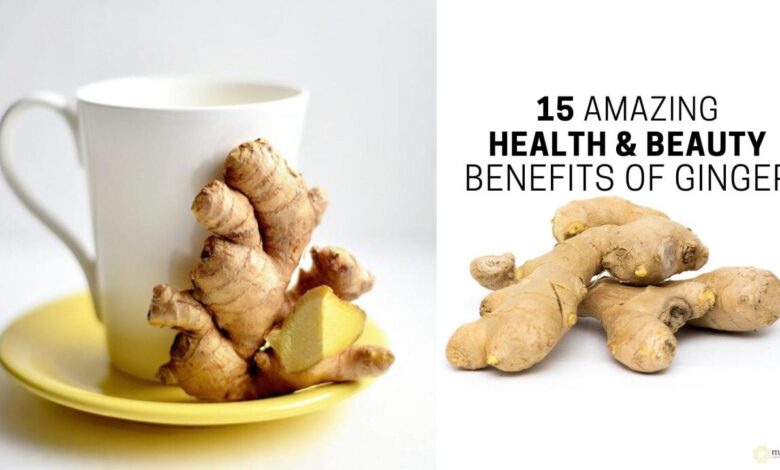
Why Ginger A Modern Wellness Must-Have
Why Ginger is a Must-Have Herb for Modern Wellness. Ginger, a spice with a rich history and cultural significance, offers a surprising array of health benefits. From easing digestive woes to boosting immunity, this versatile root is more than just a culinary delight. Its potent compounds are proving invaluable in modern wellness practices, and this exploration delves into the reasons why ginger deserves a prominent spot in your health routine.
This article will explore the science behind ginger’s effectiveness, highlighting its roles in digestive health, anti-inflammation, immunity support, pain relief, and culinary versatility. We’ll also touch upon potential side effects and safety considerations. Whether you’re a seasoned health enthusiast or just starting your wellness journey, this comprehensive guide will equip you with the knowledge to harness the power of ginger for a healthier, more vibrant life.
Introduction to Ginger’s Wellness Benefits
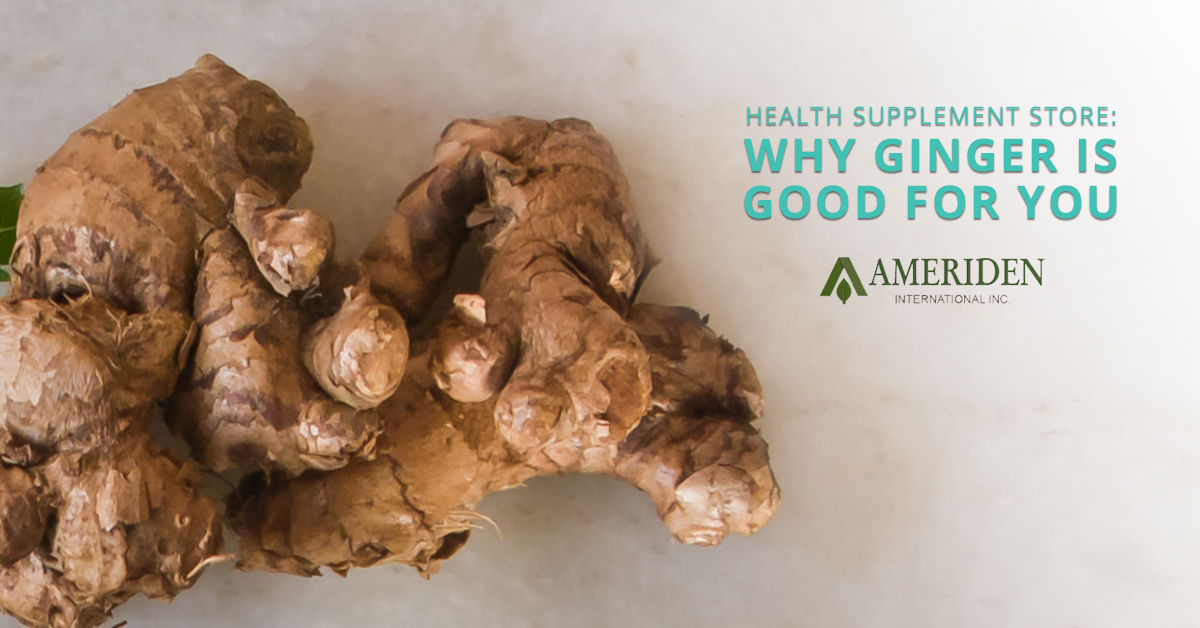
Source: bigcommerce.com
Ginger, a vibrant root with a spicy kick, has captivated cultures for centuries. From ancient Ayurvedic medicine to modern wellness practices, its versatility and potential health benefits are widely recognized. More than just a flavorful addition to dishes, ginger holds a potent place in supporting overall well-being, offering a natural approach to various health concerns. Its ability to soothe digestive discomfort, reduce inflammation, and potentially boost immunity makes it a valuable addition to a modern wellness toolkit.Ginger’s history is deeply intertwined with its medicinal use.
In many traditional healing systems, ginger was prized for its ability to alleviate pain, nausea, and inflammation. This historical recognition, combined with mounting scientific evidence, underscores its potential for modern wellness. Its ability to combat nausea, support digestion, and potentially reduce inflammation make it a valuable asset in managing various health conditions.
Forms of Ginger and Their Applications
Ginger is available in diverse forms, each with unique applications. Understanding these variations allows for optimal utilization of this versatile root.
| Form | Description | Common Applications |
|---|---|---|
| Fresh Ginger | The raw, vibrant root, typically peeled and sliced. | Adding to stir-fries, soups, and teas; preparing fresh ginger juice; incorporating into smoothies. |
| Dried Ginger | Ginger root that has been dehydrated. | Making ginger tea, adding to baked goods, and using in spice blends. |
| Ginger Powder | Ground ginger root. | Adding to curries, stir-fries, and marinades; incorporating into spice rubs for meats. |
| Ginger Extract/Tincture | Concentrated ginger in liquid form. | Using as a supplement for digestive issues or nausea; incorporating into topical remedies. |
The table above illustrates the variety of ginger forms and their respective applications, enabling individuals to choose the most suitable method for their needs. Each form offers a different way to enjoy the benefits of ginger, whether it’s through culinary preparations or dietary supplements.
Ginger’s Role in Digestive Health
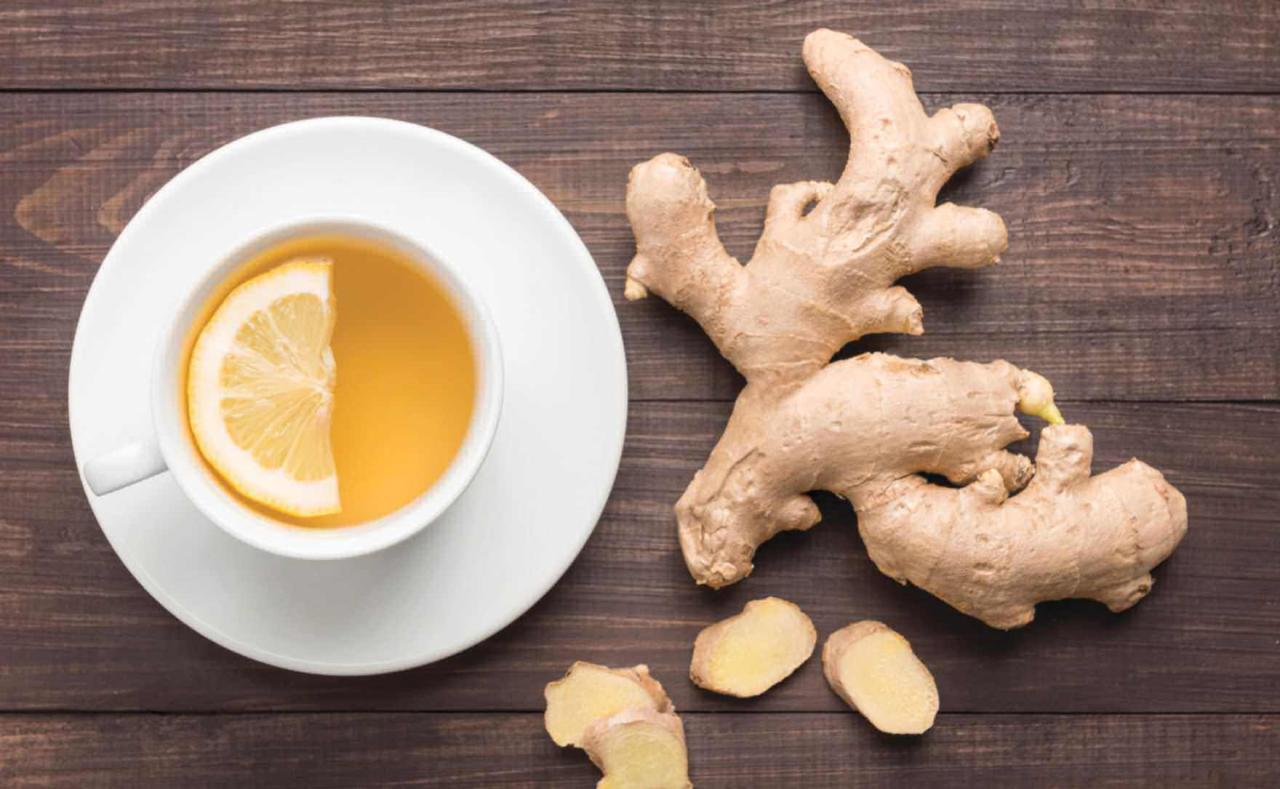
Source: magzter.com
Ginger’s potent anti-inflammatory and antioxidant properties extend beyond general wellness, playing a significant role in supporting digestive health. It effectively addresses common digestive issues like nausea, bloating, and indigestion, offering a natural and often effective solution. Its mechanisms of action are multifaceted and scientifically supported, making it a valuable addition to a holistic approach to digestive well-being.Ginger’s mechanisms for easing digestive discomfort stem from its unique chemical composition.
Active compounds like gingerol and shogaol exhibit anti-inflammatory and antispasmodic effects. These properties help relax the smooth muscles of the digestive tract, reducing spasms and cramping often associated with indigestion. Furthermore, ginger can stimulate the production of digestive enzymes, thus improving the breakdown and absorption of food. This, in turn, can help reduce bloating and discomfort.
Impact on Specific Digestive Issues
Ginger’s impact on digestive issues is notable. For instance, its anti-nausea properties are well-documented, often utilized for morning sickness or nausea related to motion sickness or other causes. Its ability to reduce inflammation in the stomach and intestines is key to easing discomfort from indigestion. Ginger also promotes healthy gut motility, which helps prevent and relieve bloating and gas.
Ginger’s amazing anti-inflammatory properties are a game-changer for modern wellness, but did you know other powerful superfoods exist? For instance, discover the incredible nutritional benefits of moringa leaves – packed with vitamins and minerals – by checking out Learn the Hidden Nutritional Power of Moringa Leaves Today. While moringa is impressive, ginger’s versatility in everything from soothing digestion to boosting immunity makes it a must-have herb in any wellness routine.
Ginger vs. Other Digestive Remedies
The effectiveness of ginger can be compared to other common remedies. While individual responses vary, ginger often shows promising results in easing digestive discomfort. A comparative analysis of ginger’s effectiveness to other remedies is presented below.
| Remedy | Mechanism of Action | Potential Benefits | Limitations |
|---|---|---|---|
| Ginger | Anti-inflammatory, antispasmodic, stimulates digestive enzymes | Reduces nausea, bloating, indigestion, improves gut motility | May not be suitable for all individuals or conditions; requires further research in some cases |
| Peppermint Oil | Relaxing effect on digestive muscles | Reduces gas, bloating, cramping | Potential for adverse effects in some individuals, may not be effective for all types of digestive discomfort |
| Chamomile Tea | Calming effect on the digestive system | Reduces anxiety and stress, can soothe indigestion | May not be as effective for severe digestive issues |
Preparing Ginger Tea for Digestive Support, Why Ginger is a Must-Have Herb for Modern Wellness
Ginger tea is a simple and effective way to harness ginger’s digestive benefits. Here’s a step-by-step guide to prepare a soothing and beneficial ginger tea:
- Gently wash and peel a 1-2 inch piece of fresh ginger root.
- Slice the ginger root thinly.
- Place the sliced ginger in a teapot or mug.
- Pour boiling water over the ginger.
- Cover and steep for 5-10 minutes.
- Strain the tea and drink warm.
Enjoy your ginger tea!
Ginger’s Anti-inflammatory Properties
Ginger, a vibrant root known for its pungent aroma and spicy taste, boasts a wealth of medicinal properties. One of its most significant contributions to modern wellness lies in its potent anti-inflammatory effects. This ability stems from the presence of various bioactive compounds that actively target and mitigate inflammatory processes within the body. Understanding the science behind ginger’s anti-inflammatory action provides insight into its potential benefits for various health conditions.Ginger’s anti-inflammatory prowess is supported by a growing body of scientific evidence.
Studies have shown that ginger’s active compounds, such as gingerol and shogaol, can inhibit the production of inflammatory mediators. These compounds exert their effects by interfering with the signaling pathways that trigger and perpetuate inflammation. By modulating these pathways, ginger effectively reduces the intensity and duration of the inflammatory response.
Scientific Evidence Supporting Anti-inflammatory Effects
Numerous research studies have investigated the anti-inflammatory properties of ginger. These studies have demonstrated that ginger extracts and isolated compounds can effectively reduce markers of inflammation, such as cytokines and prostaglandins. For instance, some research suggests that ginger can inhibit the production of inflammatory cytokines like TNF-alpha and IL-6, crucial players in the inflammatory cascade. These findings support the notion that ginger may play a significant role in managing various inflammatory conditions.
Mechanisms of Action
Ginger’s anti-inflammatory action is multifaceted, targeting several key components of the inflammatory response. Gingerol and shogaol, the primary active compounds, can inhibit the activation of inflammatory enzymes, thus reducing the production of inflammatory mediators. They also demonstrate the potential to stabilize cell membranes, preventing further damage and inflammation. Further, these compounds have been shown to modulate the expression of genes involved in the inflammatory cascade, further contributing to their anti-inflammatory impact.
Conditions Where Ginger’s Anti-inflammatory Properties Can Be Beneficial
Ginger’s anti-inflammatory properties make it a potential therapeutic agent for a range of conditions. Its ability to reduce inflammation may prove beneficial in managing conditions such as:
- Arthritis: Ginger’s anti-inflammatory effects can potentially alleviate pain and swelling associated with osteoarthritis and rheumatoid arthritis.
- Gastrointestinal Issues: Inflammation in the digestive tract can contribute to conditions like inflammatory bowel disease (IBD). Ginger may help reduce inflammation and promote healing.
- Headaches and Migraines: Some studies suggest that ginger’s anti-inflammatory properties may help alleviate headaches and migraines, potentially by reducing inflammation in the affected areas.
- Menstrual Cramps: Ginger’s anti-inflammatory and analgesic properties may offer relief from the pain and discomfort associated with menstrual cramps.
- Muscle and Joint Pain: Inflammation plays a role in muscle and joint pain. Ginger may help reduce inflammation and associated pain.
Comparison of Ginger’s Anti-inflammatory Potential with Other Natural Remedies
While ginger possesses promising anti-inflammatory properties, comparing its efficacy to other natural remedies can provide a broader perspective.
| Remedy | Potential Anti-inflammatory Mechanisms | Conditions Potentially Benefited |
|---|---|---|
| Ginger | Inhibits inflammatory mediators, stabilizes cell membranes, modulates gene expression. | Arthritis, digestive issues, headaches, menstrual cramps, muscle/joint pain |
| Turmeric | Rich in curcumin, a potent anti-inflammatory compound. | Arthritis, inflammation-related conditions |
| Willow Bark | Contains salicin, a compound with analgesic and anti-inflammatory properties, similar to aspirin. | Pain relief, inflammation reduction |
Ginger’s Impact on Immunity and Wellbeing
Ginger, a vibrant and versatile root, offers more than just culinary appeal. Its powerful bioactive compounds contribute significantly to a robust immune system and overall well-being. From soothing digestive issues to supporting immune function, ginger has earned a prominent place in modern wellness practices.Ginger’s immune-boosting properties stem from its rich array of bioactive compounds, including gingerols and shogaols.
These compounds exhibit potent antioxidant and anti-inflammatory effects, directly influencing immune cell function and overall immune response.
Ginger’s Role in Supporting Immune Cell Function
Ginger’s bioactive compounds act as natural immunomodulators, influencing the activities of key immune cells. They help regulate the production of cytokines, proteins that play a crucial role in orchestrating the immune response. This regulation is vital for preventing overreactions of the immune system, which can lead to inflammation and other health issues.
Ginger’s incredible versatility makes it a must-have for modern wellness. Beyond its delicious flavor, it’s a powerful ally for digestive health. For example, it’s renowned for its ability to soothe upset stomachs and ease nausea, making it a natural remedy for various ailments. Learn more about how ginger helps relieve nausea and promotes a healthy stomach here.
This makes ginger a truly valuable addition to any wellness toolkit, offering natural support for overall well-being.
Ginger’s Antiviral and Antibacterial Properties
Studies suggest that ginger possesses antiviral and antibacterial properties, potentially offering protection against certain infections. Its compounds may interfere with the replication of viruses and bacteria, thus bolstering the body’s natural defenses. Further research is needed to fully understand the extent of these effects.
Ginger-Infused Recipes for Enhanced Immunity
A balanced diet plays a vital role in supporting immune health, and incorporating ginger into your meals and beverages can be a delicious and effective way to enhance your immunity. The following table presents several ginger-infused recipes that can be easily integrated into your daily routine.
| Recipe | Ingredients | Instructions |
|---|---|---|
| Ginger-Lemon Tea | Ginger slices, lemon slices, water | Boil water, add ginger and lemon slices. Steep for 5-10 minutes. Drink hot. |
| Ginger-Honey Syrup | Ginger, honey, water | Simmer grated ginger in water until soft. Add honey and stir until dissolved. Store in a cool place. |
| Ginger-Chicken Soup | Chicken broth, ginger, vegetables | Add grated ginger to chicken broth and simmer with your favorite vegetables. |
| Ginger-Infused Smoothie | Ginger, fruits, yogurt, milk | Blend ginger with your preferred fruits, yogurt, and milk for a quick and healthy smoothie. |
Incorporating Ginger into Your Daily Routine
Integrating ginger into your daily life can significantly enhance your overall well-being and support your immune system. Consider these simple yet effective ways to incorporate ginger into your routine:
- Add grated ginger to your morning smoothie or juice. This is a simple way to start your day with a dose of ginger’s immune-boosting properties.
- Use ginger in cooking. Incorporate grated ginger into stir-fries, soups, or curries. This can add a unique flavor and a boost of nutrients to your meals.
- Sip ginger tea throughout the day. Ginger tea can help soothe the digestive system and potentially reduce inflammation.
- Take ginger supplements. Consult with a healthcare professional before using ginger supplements, especially if you have pre-existing medical conditions.
Ginger for Pain Relief and Muscle Recovery
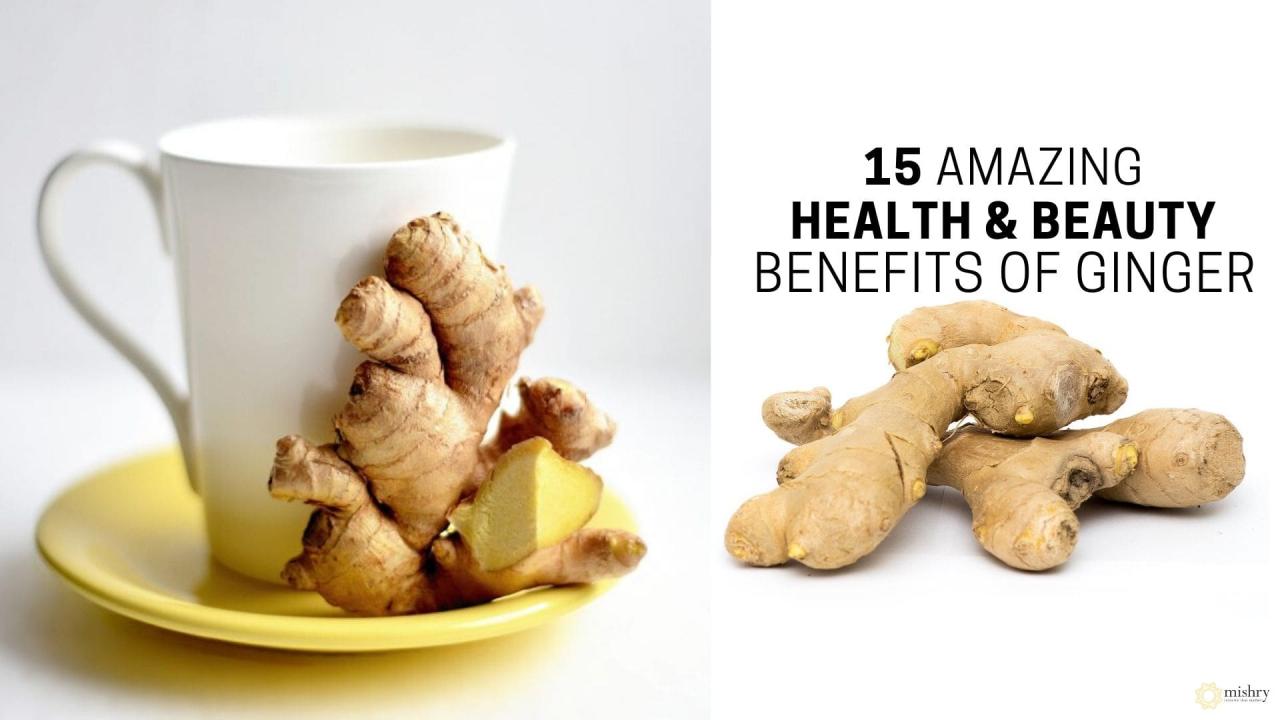
Source: mishry.com
Ginger’s potent anti-inflammatory and analgesic properties extend beyond culinary uses, offering significant benefits for pain relief and muscle recovery. Its ability to reduce inflammation and promote blood flow contributes to a faster healing process, making it a valuable tool for athletes and individuals experiencing muscle soreness or pain.Ginger’s unique chemical compounds, particularly gingerol and shogaol, are responsible for its pain-relieving effects.
These compounds act on the central nervous system to inhibit the transmission of pain signals, and also reduce inflammation throughout the body. This dual action is crucial for addressing both the immediate pain and the underlying inflammatory processes contributing to discomfort.
Methods for Ginger Pain Relief
Ginger’s versatility extends to various pain relief methods. Effective use involves understanding how ginger interacts with the body and how best to incorporate it into your routine. Different methods target different areas and have varying degrees of impact.
| Method | Description | Application |
|---|---|---|
| Topical Application | Applying ginger directly to the affected area can provide localized relief. This method is particularly useful for muscle soreness, sprains, or bruises. | Massage a paste made from fresh ginger into the affected area. Consider adding a carrier oil like coconut or olive oil for easier application and increased absorption. |
| Consumption | Ingesting ginger in various forms can offer systemic pain relief. This method is beneficial for overall pain management and recovery. | Drink ginger tea, consume ginger supplements, or incorporate ginger into meals. Choose methods that best suit your taste and dietary needs. |
| Ginger Baths | Soaking in a warm bath with ginger can help relax muscles and ease pain. | Add grated ginger or ginger essential oil to a warm bath. The heat and ginger’s properties will soothe the muscles and improve circulation. |
Ginger-Based Muscle Recovery Drink
This recipe focuses on creating a refreshing and nutrient-rich drink to support muscle recovery. The ginger aids in reducing inflammation and promoting blood flow, crucial for healing and reducing muscle soreness after exercise.
“Ginger can significantly reduce muscle soreness and inflammation after exercise, promoting faster recovery.”
Ingredients:
Ginger’s anti-inflammatory properties are amazing for modern wellness, boosting digestion and easing nausea. But did you know other spices offer similar benefits? For instance, exploring the powerful health benefits of black nutmeg and clove, like their potential to support immune function, is equally fascinating Discover the Powerful Health Benefits of Black Nutmeg and Clove. Ultimately, incorporating a variety of herbs and spices into your diet, like ginger, is key for a holistic approach to well-being.
- 1 inch piece of fresh ginger, peeled and sliced
- 1 cup water
- 1/2 cup unsweetened almond milk (or any milk of choice)
- 1/4 teaspoon honey or maple syrup (optional, for sweetness)
- Pinch of salt
- Optional: lemon juice, mint leaves, or other herbs for flavor
Instructions:
- Combine ginger slices, water, and almond milk in a saucepan.
- Bring to a simmer over medium heat, then reduce heat and let it gently simmer for 5-7 minutes.
- Remove from heat and let it steep for another 5 minutes, allowing the ginger’s flavor to infuse into the liquid.
- Strain the mixture, discarding the ginger slices.
- Add honey or maple syrup (if using) and a pinch of salt to taste. Stir well.
- Add lemon juice and/or mint leaves for flavor if desired.
- Serve warm or chilled.
Ginger in Culinary Applications
Ginger, a versatile and flavorful root, transcends its medicinal properties to become a culinary star. Its pungent aroma and subtle warmth add depth and complexity to a wide range of dishes, from savory stir-fries to sweet desserts. This section explores the innovative ways to incorporate ginger into everyday meals, highlighting its use in different cuisines and its impact on flavor profiles.Ginger’s culinary applications are as diverse as the cuisines it graces.
From enhancing the tanginess of Asian stir-fries to complementing the richness of Indian curries, ginger’s versatility is undeniable. Understanding how to select and prepare ginger, along with its optimal culinary pairings, is key to unlocking its full potential in your kitchen.
Innovative Ways to Incorporate Ginger
Ginger’s versatility extends beyond simple grating. Experiment with different preparation methods to unlock its full flavor potential. Grate fresh ginger for delicate flavor in salads, or finely chop it for stir-fries. Ginger can be used as a marinade for meats, or as a component in sauces. Even roasted ginger adds a unique depth to sweet and savory dishes.
- Add a pinch of ground ginger to your morning oatmeal for a subtle warmth.
- Combine grated ginger with lemon juice and honey for a refreshing ginger-lemon drink.
- Infuse ginger into your favorite tea for a soothing and flavorful beverage.
- Roast ginger slices with vegetables for a caramelized sweetness and aromatic dish.
- Use ginger in marinades for chicken or pork to add a spicy kick.
Comparing Culinary Uses Across Cuisines
Ginger’s presence in various cuisines reflects its cultural significance. Its unique flavor profile complements a range of ingredients and cooking styles.
| Cuisine | Traditional Use |
|---|---|
| Asian (e.g., Chinese, Thai, Japanese) | Frequently used in stir-fries, soups, and curries. Often paired with soy sauce, garlic, and other aromatic spices. |
| Indian | Integral part of many curries, chutneys, and pickles. Its warmth complements the spiciness of other ingredients. |
| Mexican | Used in some traditional salsas and marinades, although not as prominent as in other cuisines. |
| Vietnamese | Used in pho, spring rolls, and other dishes. The fresh ginger adds a vibrant flavor. |
Enhancing Flavor Profiles
Ginger’s distinctive flavor can elevate a wide range of dishes. Its subtle warmth complements sweet and savory dishes alike.
- In savory dishes, ginger pairs well with soy sauce, garlic, and other aromatic spices.
- Ginger adds a pleasant zing to salads and stir-fries.
- Ginger can enhance the flavor of meat marinades and sauces.
- In desserts, ginger provides a unique warmth that complements sweet flavors.
Choosing the Best Quality Ginger
Selecting high-quality ginger is crucial for optimal flavor and culinary experience. Look for firm, smooth roots with vibrant color.
- Fresh ginger should have a firm texture and a bright, vibrant color. Avoid ginger that feels soft, mushy, or has brown spots.
- Ginger quality affects flavor and aroma. Fresh, high-quality ginger will impart a more intense and satisfying flavor in dishes.
- Storage is key to preserving freshness. Store ginger in a cool, dry place, wrapped in a damp cloth or paper towel.
Ginger in Beauty and Skincare
Ginger, renowned for its culinary and medicinal uses, is increasingly recognized for its potential benefits in skincare. Its potent anti-inflammatory and antioxidant properties contribute to a healthier, more radiant complexion. From soothing redness to promoting collagen production, ginger’s versatile nature makes it a promising addition to any skincare routine.
Ginger’s Anti-inflammatory Effects on Skin
Ginger’s anti-inflammatory compounds, including gingerol and shogaol, can effectively combat redness and irritation associated with skin conditions like acne and eczema. These compounds help reduce inflammation by inhibiting the production of inflammatory mediators, resulting in a calmer, less reactive skin environment. Studies suggest that topical application of ginger extracts can alleviate skin inflammation and improve skin barrier function.
Ginger and Skin Hydration
Ginger’s hydrating properties contribute to improved skin elasticity and suppleness. Its ability to promote blood circulation to the skin may contribute to a more even and healthy skin tone. Adequate hydration is crucial for maintaining healthy skin, and ginger, with its natural moisturizing compounds, can play a significant role. Improved circulation may also lead to a more vibrant and radiant complexion.
Ginger’s Antioxidant Properties in Skincare
Ginger is rich in antioxidants, which help neutralize harmful free radicals. These free radicals can damage skin cells, contributing to premature aging and the appearance of wrinkles. By combating oxidative stress, ginger helps protect the skin from environmental damage, promoting a youthful and healthy appearance. Antioxidants are essential for maintaining the skin’s natural protective barrier.
Ginger in Skincare Products
Ginger is used in various skincare products, including face masks, serums, and creams. Its inclusion often enhances the overall efficacy and benefits of these products. The addition of ginger can address a variety of skin concerns, from inflammation to dryness.
Ginger Face Mask Recipe
- Ginger extract or grated fresh ginger: Fresh ginger is a great natural source of gingerol. Grated fresh ginger can be used directly or diluted with other ingredients.
- Honey: Honey is a natural humectant and antioxidant, which helps to hydrate and protect the skin.
- Yogurt or Milk: These dairy products offer moisturizing properties that can help to replenish the skin’s moisture content.
- Optional additions: Other ingredients like turmeric or aloe vera can be added for extra benefits.
These ingredients, when combined, create a potent and versatile mask that addresses multiple skin concerns. The recipe below provides a basic framework, which can be adjusted based on your specific skin type and needs.
| Ingredient | Quantity | Function |
|---|---|---|
| Fresh Ginger | 1 teaspoon | Anti-inflammatory, antioxidant |
| Honey | 1 teaspoon | Moisturizing, antioxidant |
| Yogurt | 2 tablespoons | Moisturizing, soothing |
Step-by-Step Ginger Face Mask Guide
- Gently grate a small piece of fresh ginger.
- In a small bowl, combine the grated ginger, honey, and yogurt.
- Apply the mixture evenly to your face, avoiding the eye area.
- Leave the mask on for 15-20 minutes.
- Rinse off with lukewarm water.
- Follow up with your regular moisturizer.
Regular use of a ginger face mask can contribute to improved skin texture, reduced inflammation, and increased radiance.
Ginger and Potential Side Effects
Ginger, despite its numerous health benefits, can cause some side effects in certain individuals. Understanding these potential drawbacks and the associated safety precautions is crucial for responsible use. A balanced approach to ginger consumption, acknowledging its potential risks, is key to maximizing its benefits and minimizing any adverse reactions.While generally considered safe, ginger can interact with certain medications and conditions, necessitating careful consideration.
Knowing when to consult a healthcare professional is important for ensuring your safety and well-being when incorporating ginger into your routine.
Possible Side Effects of Ginger Consumption
Ginger, although a potent medicinal herb, can trigger various side effects in some individuals. These side effects, while often mild, should be taken seriously. Common reported side effects include heartburn, nausea, and stomach upset. In some cases, more severe reactions like allergic reactions, such as skin rashes or hives, have been reported. The severity and frequency of these reactions vary considerably.
Safety Precautions Associated with Ginger Use
Ginger’s potency necessitates careful consideration of safety precautions. For instance, pregnant women or those with specific health conditions should consult a healthcare professional before consuming ginger. Individuals with bleeding disorders should exercise caution, as ginger can potentially thin the blood. Consistent, high doses of ginger might lead to issues, like gastrointestinal discomfort. Also, it’s crucial to be mindful of potential interactions with other medications.
Potential Interactions Between Ginger and Other Medications
Ginger can interact with several medications, potentially altering their effectiveness or causing adverse reactions. These interactions can be particularly important for individuals taking blood-thinning medications, as ginger may increase the risk of bleeding. For individuals taking medications for diabetes or blood pressure, ginger’s effect on blood sugar and blood pressure should be monitored carefully. The potential for interaction can be more complex for individuals taking multiple medications.
| Medication Category | Potential Interaction | Explanation |
|---|---|---|
| Blood Thinners (e.g., Warfarin) | Increased risk of bleeding | Ginger can potentiate the effect of blood thinners, increasing the risk of bleeding. |
| Diabetes Medications | Potential blood sugar fluctuations | Ginger can influence blood sugar levels, potentially requiring adjustments to diabetes medication. |
| Anti-inflammatory Drugs (NSAIDs) | Potential gastrointestinal upset | Combining ginger with NSAIDs may increase the risk of stomach upset or ulcers. |
| Certain Heart Medications | Potential for altered heart rate | Ginger’s effect on blood vessels and heart rate may need to be considered in conjunction with certain heart medications. |
When to Consult a Healthcare Professional Regarding Ginger Use
Certain situations necessitate consulting a healthcare professional before incorporating ginger into your routine. Individuals with pre-existing health conditions, such as gastrointestinal issues or bleeding disorders, should always consult a doctor. If you experience any unusual or persistent side effects after consuming ginger, seeking medical advice is crucial. Also, if you are taking other medications, it’s essential to discuss ginger consumption with your doctor to avoid potential interactions.
Conclusion
Ginger, a humble root, has proven its remarkable versatility and potent benefits for modern wellness. From bolstering digestion to easing inflammation and boosting immunity, its applications extend far beyond the kitchen. This comprehensive exploration highlights ginger’s remarkable contributions to holistic health, demonstrating its value in a world seeking natural solutions. Its versatility extends to both culinary and medicinal uses, making it an accessible and powerful ally in promoting overall well-being.Ginger’s multifaceted advantages make it a valuable addition to a comprehensive wellness routine.
Its ability to address various health concerns, from digestive discomfort to pain relief, underscores its importance in a modern world where holistic approaches to health are increasingly sought after. This natural remedy offers a pathway to improved health and well-being without relying solely on synthetic solutions.
Key Takeaways
This section summarizes the key benefits of incorporating ginger into your lifestyle.
- Ginger’s powerful anti-inflammatory properties contribute to reduced pain and discomfort, potentially easing conditions like arthritis and muscle soreness. This natural pain relief mechanism provides a valuable alternative to conventional treatments.
- Ginger’s role in digestive health is significant. It aids in easing nausea, bloating, and other digestive issues, offering a natural remedy for common digestive ailments.
- Ginger’s positive impact on immunity strengthens the body’s defenses against illness, potentially reducing the frequency and severity of infections. This contributes to a stronger immune system, an important aspect of modern well-being.
- Its versatility extends to culinary applications, enriching meals and beverages with its unique flavor profile. This natural flavor enhancer adds a delightful dimension to daily cuisine, without compromising health benefits.
- Ginger’s use in beauty and skincare provides a natural approach to maintaining healthy and radiant skin. Its antioxidant and anti-inflammatory properties help in achieving and maintaining a youthful complexion.
Summary Table
This table provides a concise overview of ginger’s diverse benefits.
| Benefit Category | Key Benefits |
|---|---|
| Digestive Health | Reduces nausea, bloating, and other digestive issues. |
| Pain Relief | Eases muscle soreness, reduces pain (e.g., arthritis). |
| Immune Support | Potentially strengthens the body’s defenses against illness. |
| Anti-inflammatory Properties | Reduces inflammation in the body. |
| Culinary Applications | Enhances flavor profiles in various dishes. |
| Beauty and Skincare | Maintains healthy and radiant skin. |
Conclusion: Embracing Ginger’s Potential
The multifaceted benefits of ginger highlight its value in a holistic approach to wellness. By integrating ginger into your daily routine, you can unlock a range of potential health improvements without relying solely on conventional treatments. Whether through culinary applications, herbal infusions, or topical treatments, ginger offers a natural path towards a healthier and more vibrant lifestyle. Explore ginger’s potential today and experience its profound impact on your overall well-being.
Last Recap: Why Ginger Is A Must-Have Herb For Modern Wellness
In conclusion, ginger’s multifaceted benefits make it a truly valuable addition to a modern wellness toolkit. From supporting digestion to boosting immunity and even providing pain relief, ginger’s versatility is remarkable. Its potent compounds and easy integration into daily life make it a compelling choice for anyone seeking natural ways to enhance their well-being. So, embrace the power of ginger, and experience its transformative effects on your health and overall wellness journey.
Let ginger become an indispensable part of your wellness routine.
Commonly Asked Questions
What are some common side effects of ginger?
While generally safe, some individuals may experience mild side effects like heartburn, nausea, or stomach upset. These effects are usually temporary and less severe than those associated with other medications. Always start with a small amount and monitor your body’s response.
Can ginger interact with other medications?
Yes, ginger can interact with certain medications, particularly blood thinners. It’s crucial to consult with your doctor before incorporating ginger into your routine if you’re taking any prescription medications.
How much ginger should I consume daily?
The recommended daily intake of ginger varies depending on the form and individual needs. A general guideline is to start with small amounts and gradually increase based on your tolerance. Always prioritize safety and listen to your body’s signals.
Is ginger suitable for all ages and health conditions?
While generally safe, ginger use may not be suitable for everyone. Pregnant women, individuals with specific medical conditions, or those taking certain medications should consult with a healthcare professional before incorporating ginger into their routine.

